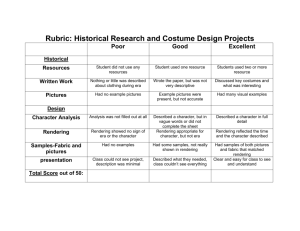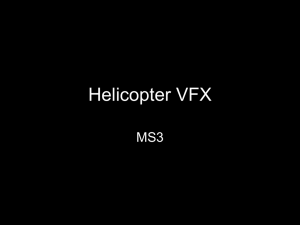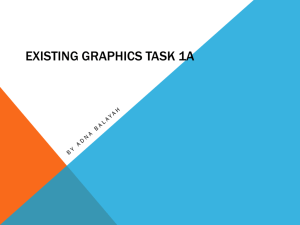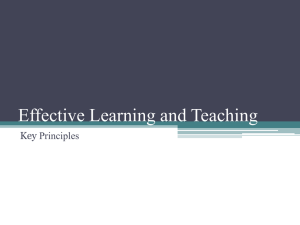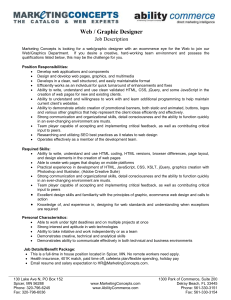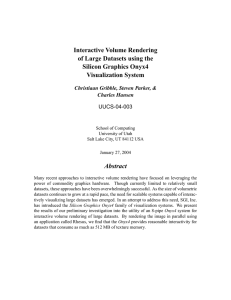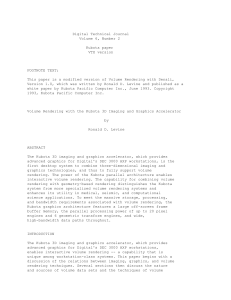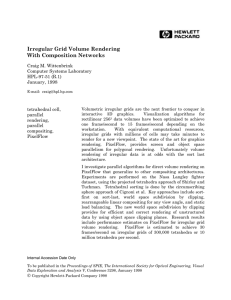Sin título de diapositiva
advertisement
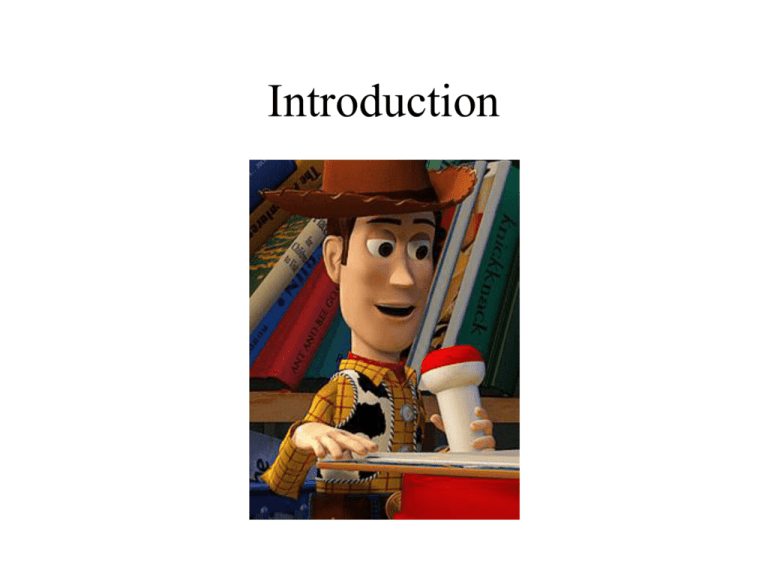
Introduction Agenda • • • • • Introduction to Computer Graphics History CG in films Applications Contents of the course What are Computer Graphics? • Edition of models and figures – Create, store, modify and render • The final output on the screen are pixels Elements of Computer Graphics • Hardware – CPU, video card, display, ... • Software – modeler, capturer, renderer, … • People – programmer, designer, animator, … • Products – applications, films, images, models, ... Short history of Computer Graphics • 1940: first project of a Computer Graphics system • 1951: Whirlwind: representation of data of a radar • 1961: Spacewar, first video game Sketchpad • Ivan Sutherland (doctoral thesis in MIT, 1963) • First interactive graphic system – – – – – – Display of primitives Hierarchic models Constraints based Optic pen Function keys Popup menus Evolution of hardware • Vectorial displays – based on oscilloscopes • 1975: Cathode Ray Tube (CRT) – Time independent of number of elements – introduction of frame buffer • 1980: low cost hardware -> spreading of graphic applications Rendering • • • • 1971 – Gouraud surface rendering 1974 - Z-Buffer algorithm, Catmull 1975 – Phong surface rendering 1975 – Fractal geometry of Mandelbrot Rendering • • • • 1976 - Textures, James Blinn, Catmull 1978 – Curve surfaces, James Blinn 1980 - Ray tracing, Turner Whitted 1984 - Radiosity, Cornell University Rendering • 1985 – Solid textures, Perlin • 1988 - Renderman, Pixar • 1995 – first feature film: Toy Story Computer Graphcis in films • 1982 1982 1973 Star Trek II - 1983 Star Wars 1977 Tron 1980 Feature films made with computer graphics • • • • • • • • • Toy Story Bugs (Bichos) Hormigaz (Antz) Monsters Inc. Shrek Toy Story 2 Dinosaurs Ice Age, Barbie, … Finding Nemo Pixar DreamWorks Others Simulation of “reality” • Stars Wars, Episode 1 • Jurassic Park • Final Fantasy Capture of real movement Special effects The Adventures of Rocky & Bullwinkle, The Beach, Cast Away, Chicken Run, Dinosaur, Gladiator, Hollow Man, How the Grinch Stole Christmas, Mission to Mars, The Perfect Storm, Pitch Black, Nutty Professor II: The Klumps, Space Cowboys, Bicentennial Man, Fight Club, Inspector Gadget, Iron Giant, The Matrix, Sleepy Hollow, Star Wars: The Phantom Menace, Stuart Little, Toy Story 2, The World is Not Enough, Babe: Pig in the City, A Bug’s Life, Patch Adams, What Dreams May Come, Contact, Jurassic Park: The Lost World, Men in Black, Starship Troopers, Apollo 13, Balto, Batman Forever, Casper, Indian in the Cupboard, Jumanji, Outbreak, Pocahontas, Species, Toy Story, Clear & Present Danger, Forrest Gump, Interview with a Vampire, The Jungle Book, The Lion King, The Mask, Miracle on 34th Street, Speed, True Lies, Cliffhanger, Demolition Man, Free Willy, Jurassic Park, Aladdin, Batman, Returns, Death Becomes Her, Beauty and the Beast, Star Trek VI, Terminator II, Jetsons, The Abyss, StarQuest, Young Sherlock Holmes, Artificia Intelligence, Evolution, Minority Report, Mission: Impossible 2,Forces, ... Games • 1972 Pong • 1978 Space Invaders • 1980 Pacman • 1985 Commodore Amiga • 1988 Tetris • 1989 Game boy http://jamillan.com/primavera/crono.htm Applications in different areas • • • • • • User interface CAD Medicine Scientific Visualization Simulation Leisure time – films, video games, ... Contents of the course Graphic libraries • They are libraries with functions to render graphics • Examples – – – – OpenGL Java3D Phigs DirectX • Lenguages – WRML. Transformations • • • • • • Coordinate systems 2D Transformations 3D Transformations Transformation composition Rotating about a pivot Rotating about an axis. Model of 3D objects • Objects building • Rendering of objects • Polygonal representation – structure, creation, mesh, attributes, ... • Others methods (splines, CGS, volumetric). Camera • • • • • Coordinate systems and transformations Viewing coordinates Coordinate transformation matrix Projections Window and viewport. Lighting • • • • • • Factors of light Reflection Ambient light Diffuse reflection Specular reflection Illumination models. Color • • • • Light and color The visible light spectrum Primary and secondary colors Color spaces – RGB, CMY, YIQ, HLS, CIE – CIE XYZ, CIE xyY and CIE diagram properties. Surface rendering methods • • • • • • Different surface rendering methods Wireframe Plane color Gouraud Phong Gouraud-Phong comparison. Rendering algorithms • Objective • Rendering of lines – DDA algorithm – Bresenham algorithm • Polygons rendering • Polygons filling • Visible surface detection. Textures • Concept of texture • Use – Texture mapping – Environment mapping – Bump mapping. Illumination models. • Local illumination model and global illumination model • The rendering equation of Kajiya • Algorithms – Ray tracing – Radiosity – Radiance application. Interaction • • • • The human senses Interaction systems Virtual reality Augmented reality. Animation • Capture and images sequences • “Sprites” animation • Key Frame animation • 3D animation • Examples: – Flash, Quicktime VR, VRML. Sound • • • • • Sound digitalization Sound process Compression Formats MIDI. Multimedia graphics and Video • Types of graphics, multimedia graphics, bitmaps, resolution, compression • Video systems • Digitalization of video, video standards, compression of video • Streamed video • Edition of digital video and process Graphic Hardware • Description of the elements • Graphic cards • Benchmarking • Projection technologies.
